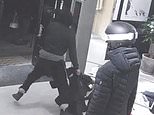London’s iconic West End, a vibrant hub of commerce and culture, has recently become the focal point of a significant shoplifting crisis, prompting an intensified police crackdown on persistent London crime. Authorities are now actively combatting a surge in brazen thefts, ranging from high-value designer apparel to everyday consumer goods, aiming to restore a sense of security to both retailers and visitors in this vital district.
One notable incident involved Omar Innis, 32, who was apprehended by West End district officers on July 25, just minutes after embarking on a £1,300 board game theft spree. His suspicious behaviour, coupled with prior reports from local shop owners regarding an increase in board game thefts, quickly led to his capture, highlighting the proactive efforts of law enforcement in the area.
Similarly, the effectiveness of the rapid police response was demonstrated when a group of individuals, having allegedly stolen £100,000 worth of Apple products from an O2 phone shop on Tottenham Court Road, were cornered by police within minutes in Cranleigh Street, less than a mile away. This swift action underscores the Metropolitan Police’s commitment to disrupting organised retail crime networks operating in central London.
Further showcasing the persistent shoplifting crisis, a rampant clothes thief was arrested in Covent Garden in June, following a two-month period during which he stole £9,000 worth of high-end clothing. Captured on camera brazenly wrenching items from rails, his apprehension, even after attempting to flee, reinforces the determination of officers tackling these escalating issues.
The Met Police, facing accusations of not adequately addressing the challenge amidst an “ever-shrinking” budget, has now committed to a substantial increase in officer presence within the West End—boosting numbers by over 50 percent. This strategic deployment is a direct response to the escalating London crime rates, particularly theft prevention and knife crime, which have reached record levels across the city.
Beyond traditional shoplifting crisis, the capital has grappled with an alarming rise in phone snatching, with 80,000 smartphones reported stolen last year, equating to a staggering £50 million loss. Past incidents, such as the “Oxford Circus JD robbery” sparked by a TikTok call, underscore the varied and evolving nature of urban security challenges faced by London businesses.
The police crackdown extends beyond the West End, with an additional 90 officers deployed to key areas like Brixton, Kingston, and Ealing, and the legendary Flying Squad receiving 50 more officers to bolster their efforts against serious violent crime. This comprehensive approach signifies a renewed commitment to visible policing and theft prevention across the capital.
Leaders from the business community, including Ros Morgan of the Heart of London Business Alliance and the boss of Boots, have publicly welcomed the Met’s renewed focus. Met Commissioner Sir Mark Rowley reaffirmed the force’s “laser-like focus” on ensuring officers are actively engaged on the streets, directly tackling the crimes that impact Londoners most.
Early indications suggest the police crackdown is yielding positive results; the Met reports a 15 percent decrease in neighbourhood crime compared to last year, with reductions in knife crime, burglary, and robbery. In the West End, violent crimes resulting in injury are reportedly down by a quarter, and the force is making 1,000 more arrests monthly, signalling progress in combating the shoplifting crisis and restoring public confidence.






Leave a Reply